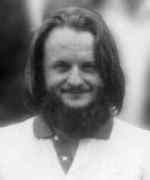Person: Conway (2), John Horton

John Conway was an English mathematician who has produced many results in the theory of finite groups, knot theory, number theory, combinatorial game theory and coding theory. He also made many contributions to recreational mathematics, including the Game of Life.
Mathematical Profile (Excerpt):
- Cyril Conway was a chemistry laboratory assistant.
- John's young years were difficult for he grew up in Britain at a time of wartime shortages.
- At primary school John was outstanding and he topped almost every class.
- Despite not having any clear idea of what mathematics was when he was at primary school, John Conway must have had it firmly fixed in his mind that he would become a mathematician.
- After leaving seconday school, Conway entered Gonville and Caius College Cambridge to study mathematics.
- Having solved the open problem posed by Davenport on writing numbers as the sums of fifth powers, Conway began to become interested in infinite ordinals.
- Also in 1964 Conway was elected to a fellowship at Sidney Sussex College, Cambridge.
- Things were to change suddenly for Conway.
- Around 1965 John Leech found a dense packing of spheres in 24 dimensions with a lattice now known as the Leech lattice.
- This work by Conway was to transform his mathematical career.
- Conway announced his discovery in 1968 and published full details in the first volume of the Bulletin of the London Mathematical Society in 1969.
- It was only after this kick-start to his publishing career that Conway "started doing real mathematics" having received a great boost to his confidence with one of the most remarkable discoveries in the area of mathematics which had the highest profile at that time.
- John von Neumann had looked for a universal constructor in the 1940.
- Conway showed the game to his friend Martin Gardner who described it in the October 1970 column which he wrote in Scientific American.
- The game became an instant success and Conway became a household name.
- Also in 1970 Conway was elected to a fellowship at Gonville and Caius College Cambridge and, three years later, he was promoted from lecturer to reader in Pure Mathematics and Mathematical Statistics at Cambridge.
- Another topic for which Conway is famous is discovery of surreal numbers, which again dates from around 1970.
- There is a common belief that complex numbers are the end of the road in the development of numbers and Conway's discovery is the perfect illustration of how even the number systems are part of the continually evolving subject.
- Perhaps the surprising fact is that Conway was not trying to develop number systems, but rather was analysing the game of Go. Conway studied the games of two players of Go at Cambridge who were of international standard.
- Analysing the situation Conway discovered that certain games behaved like numbers and surreal numbers were born.
- The name surreal numbers was not invented by Conway, however, but by Donald Knuth who was so impressed with Conway's discovery that he wrote Surreal Numbers (1974) in the form of a novelette aimed at introducing the ideas of mathematical research to students.
- It is impossible in a short article such as this to look at the full range of topics that Conway has studied or even to give an idea of the remarkable originality of his contributions in so many different areas.
- Conway was awarded the Berwick Prize by the London Mathematical Society in 1971.
- In March 1981 Conway was elected a fellow of the Royal Society of London.
- In 1986 Conway left Cambridge after accepting appointment to the John von Neumann Chair of Mathematics at Princeton in the United States where much of his work has focused on geometry, in particular studying the symmetries of crystal lattices.
- In 1987 Conway was awarded the Polya Prize of the London Mathematical Society.
- We should mention a few of the books Conway has written, and illustrate their importance and originality with a brief comment from a reviewer.
Born 26 December 1937, Liverpool, England. Died 11 April 2020, Princeton, New Jersey, USA.
View full biography at MacTutor
Tags relevant for this person:
Group Theory, Origin England
Thank you to the contributors under CC BY-SA 4.0! 

- Github:
-

- non-Github:
- @J-J-O'Connor
- @E-F-Robertson
References
Adapted from other CC BY-SA 4.0 Sources:
- O’Connor, John J; Robertson, Edmund F: MacTutor History of Mathematics Archive
